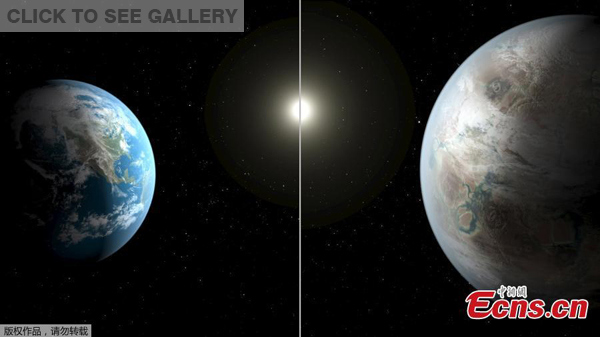(ECNS) -- Chinese astronomers have declared Kepler 452b, the newly-announced discovery hyped to be "Earth's close cousin," as unfit for human migration.
On Thursday, NASA announced the discovery of Kepler 452b, the first near-Earth-sized planet in the habitable zone around Kepler, a star that very much resembles the sun in Earth's solar system. Kepler 452b is 1.6 times the size of Earth. Its 385-day orbit is only five percent longer than Earth's.
Zheng Yongchun, an associate researcher from the National Astronomical Observatories at the Chinese Academy of Sciences said, "strictly speaking, Kepler 452b is not "another Earth." We can go only as far as claiming it to be the most Earth-like exoplanet yet discovered." However, humans can not feasibly count on Kepler 452b as a sanctuary for potential immigration.
Distance is the first problem, said Zheng. Located in Cygnus, Kepler 452b is about 1,400 light years from the Earth. Even riding on New Horizon, the fastest spacecraft available, and travelling at 59,000 km/h, it would take around 27.09 million years to get there from Earth. "It has been merely two million years since human beings first appeared on Earth."
Zhu Jin, a curator at the Beijing Planetarium said, "compared to previous discoveries, Kepler 452b has a better chance of being earth-like. However human beings can't even go beyond the solar system, thus immigration to Kepler 452b is even more far-fetched."
Moreover, key facts about Kepler 452b's including material composition and temperature still remain unknown to us. No man-made observatory can directly see Kepler 452b. Doug Caldwell, a scientist involved with the program, admits Kepler 452b may be entering a period where its temperatures could spiral out of control.
Zheng said that to be a promising candidate for inter-planet immigration a planet has to offer atmospheric protection, liquid water, reasonable temperatures, a solid rock surface, and a steady energy flow from its corresponding star. Comparably, Mars still has the edge as an immigration hope for humankind.



















































